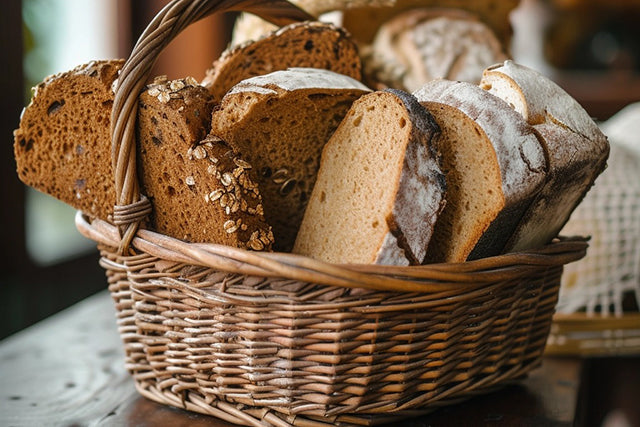What is celiac disease?
Celiac disease is an immune reaction to eating gluten, a protein found in wheat, barley, and rye. This reaction damages the small intestine lining and prevents the absorption of essential nutrients. This immune response leads to inflammation and damage, impairing the intestine's ability to absorb nutrients properly.
Celiac disease manifests through a variety of symptoms, which can vary in severity among individuals.
Digestive issues
Abdominal pain, bloating, diarrhea, and constipation are hallmark symptoms of celiac disease. These digestive disturbances occur due to inflammation and damage to the small intestine, impairing its ability to digest and absorb nutrients properly.
Fatigue and weakness
Individuals with celiac disease frequently report chronic fatigue and weakness. The body's inability to absorb essential nutrients, such as iron and B vitamins, can lead to anemia and fatigue.
Nutritional deficiencies
Malabsorption of nutrients, particularly Iron, Calcium, Vitamin D, and Vitamin B12, can result in nutritional deficiencies. These deficiencies can cause many symptoms, including bone pain, muscle weakness, and neurological issues.

Can celiac disease affect height?
When you consume gluten, your immune system launches an attack on the lining of the small intestine, causing inflammation and damage. This damage compromises the absorptive surface area of the small intestine, impairing its ability to absorb nutrients effectively.
The ramifications of small intestine damage extend far beyond mere discomfort, as malabsorption ensues, depriving the body of vital nutrients necessary for growth and development.
Vitamins A and D
Both are essential for bone health and immune function, playing pivotal roles in promoting growth. However, the compromised small intestine in celiac disease impedes the absorption of these fat-soluble vitamins, increasing the risk of deficiency and hindering optimal growth.
Calcium and Iron
Calcium is indispensable for skeletal growth and development, while Iron is vital for oxygen transport and overall health. Unfortunately, the impaired absorptive capacity of the small intestine in celiac disease might threaten the absorption of these critical minerals, potentially stunting growth and exacerbating anemia.
Proteins
Proteins serve as the building blocks of tissues and play a crucial role in supporting growth and repair processes. Nevertheless, malabsorption in celiac disease compromises the absorption of dietary proteins, limiting the body's ability to meet its growth demands and maintain muscle mass.
Celiac disease and growth issues
Children diagnosed with celiac disease often face health concerns, with growth problems being a prominent area of focus for healthcare professionals and parents alike. Its impact on growth can vary from child to child, but it is essential to recognize and address these issues early on to promote optimal development.
Short stature
Due to the body's inability to absorb essential nutrients properly, particularly during periods of rapid growth, children with untreated celiac disease may fail to reach their expected height compared to their peers. This disparity in stature can be a cause of concern for both parents and children, highlighting the importance of early diagnosis and intervention.
Weight issues
The malabsorption of nutrients, including carbohydrates, proteins, and fats, can lead to inadequate caloric intake and poor weight gain. As a result, children may appear thin or fail to gain weight at a normal rate, prompting further investigation into their nutritional status and dietary habits.
Delayed puberty
Puberty is a critical period of physical and hormonal changes in adolescents, and disruptions in this process can have long-term implications for growth and development. In children, delayed puberty may occur due to nutritional deficiencies and hormonal imbalances caused by the underlying autoimmune condition.

What are tips for managing celiac disease and promoting healthy growth?
Living with celiac disease presents unique challenges, particularly when it comes to maintaining optimal growth and overall well-being. However, with the right approach and strategies, you can thrive and achieve your full potential.
Have a balanced and nutritious gluten-free diet
The cornerstone of managing celiac disease is adhering to a strict gluten-free diet. However, it is not just about eliminating gluten-containing foods; it is also essential to ensure your diet is balanced and nutritious. Try gluten-free grains, like quinoa, buckwheat, and amaranth, which are excellent sources of protein, fiber, and essential vitamins and minerals. Incorporate plenty of colorful fruits and vegetables to provide antioxidants, vitamins, and minerals essential for cellular function and growth.
Ensure adequate intake of key nutrients
You will be at increased risk of nutrient deficiencies due to malabsorption issues. To counteract this, focus on consuming foods rich in vitamins and minerals, such as:
- Vitamin D is important for bone health and immune function. Consider incorporating fortified dairy alternatives, fatty fish, like salmon and mackerel, and sunlight exposure to boost vitamin D levels.
- Calcium is essential for bone strength and muscle function. Include calcium-rich foods, such as dairy products (if tolerated), leafy greens, fortified plant-based milk, and almonds, in your diet.
- Iron is vital for oxygen transport and energy production. Opt for lean meats, poultry, beans, lentils, tofu, and fortified cereals to meet your iron needs.
Consider supplements for those with celiac disease
You also may benefit from supplementation to address specific nutrient deficiencies. Consult with a healthcare provider or registered dietitian to determine if supplementation is necessary to identify appropriate dosages based on your needs and health status.
Follow a healthy lifestyle
Regular exercise not only promotes physical health but also supports bone density and muscle development. Aim for aerobic exercise, strength training, and flexibility exercises to keep your body strong and resilient.
Quality sleep is essential for growth, repair, and overall health. Establish a regular sleep schedule and create a relaxing bedtime routine to ensure you get the restorative sleep your body needs to thrive.
When to see a doctor?
If you notice your child is not growing as expected or is significantly shorter than their peers, it could be a red flag for growth issues related to celiac disease. Consult a healthcare provider to evaluate your child's growth patterns and address any concerns.
Children with celiac disease may express concerns about their height, especially if they recognize that they are not growing as tall as their friends or siblings. Take your child's concerns seriously and discuss them with a doctor to determine if further evaluation is needed.
In addition to these signs, adults should prioritize regular checkups and monitoring of their growth and health status. While celiac disease is often diagnosed in childhood, it can also manifest or persist into adulthood, necessitating ongoing medical supervision to prevent complications and ensure optimal management of the condition.
To sum up,
The link between celiac disease and height is undeniable, yet often overlooked. This autoimmune condition can significantly impact growth and development, particularly in children. From compromised nutrient absorption to delayed puberty, celiac disease can pose challenges that extend beyond digestive discomfort. However, with early diagnosis, vigilant management, and a supportive healthcare team, those with celiac disease can overcome these obstacles and thrive.








